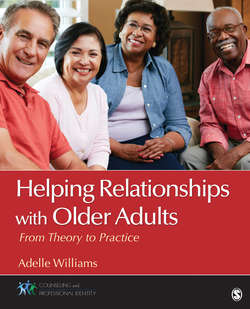Читать книгу Helping Relationships With Older Adults - Adelle M. Williams - Страница 15
На сайте Литреса книга снята с продажи.
Aging
ОглавлениеAging is characterized by a variety of changes. These changes can be social, physical, or cognitive. Constant adjustments and readjustments are required to maintain some sense of normalcy.
Socially, a number of adjustments may occur, such as a change in the quantity and quality of relationships one has, a change in role from a caregiver to a care receiver, becoming single after being married for 50 years, and transitioning from utilizing informal supports (e.g., family, friends) to formal support systems (e.g., long-term care facilities, respite care services). Society’s perception of aging persons can change as well, with many perceiving older persons as less valued. Environmental modifications can be required if older adults live in environments that are inconsistent with their functional abilities. Changes in their residence, proximity to significant others, and driving status will impact their social situation.
Physical changes are an inevitable consequence of the aging process. Gradual changes will occur in an older adult’s senses, appearance, balance, strength, and cognition, though most conditions can be addressed and corrected in the earlier stages. Sense of taste and smell will decline with age; however, there may exist other causes for impaired taste and smell that are treatable (e.g., dental problems, nasal/sinus problems). Vision will decline, but it can be corrected at earlier stages. Hearing will become impaired, though simple modifications can correct this issue. Balance, flexibility, and muscle strength will decrease, but with adequate exercise, including cardio, strength training, and yoga, these changes do not necessarily impair one’s routine activities.
Cognition depends on a healthy, well-functioning brain. While the ability to learn, store, and retrieve information may require more time than for a younger person, barring any major disorders, older persons adapt well to changes in cognitive status. Older adults continue to have the capacity to learn new information; however, it may take longer and may require the use of more mnemonic devices to assist them.
Healthy, highly functioning older adults have high self-esteem, are internally controlled, maintain balance in their lives, minimize stressful situations, and are actively engaged in a variety of activities. They have a belief system that allows them to handle life’s ups and downs. When confronted with losses, such as that of a spouse, residence, physical and cognitive health, or relationships, they grieve but readjust to the loss and continue pursuing their goals and aspirations. However, even under the best circumstances, there are older persons who respond to losses in such a manner that necessitates the interventions of a professional. Their self-esteem and self-worth may be jeopardized, and therefore, outside support is required. This constant cycle of adjustment and re-establishment is an ongoing process for older adults and can affect their psychological well-being.
Older adults are wise, resilient, and spend most of their lives free of disabilities. However, many physical and mental conditions can accompany the aging process. With a comprehensive geriatric assessment and maintenance of a healthy lifestyle, these conditions are managed so that older persons can continue with their daily activities. Later life provides many opportunities for social interaction, participation in activities, continued employment, volunteerism, and leisure pursuits. These opportunities are different for each person because resources vary. There are older persons who will have the ability to retire, while others will continue to work. Time, income, interest, and health will determine the extent to which each older person is able to take advantage of various opportunities. Promotion and adherence to a healthy lifestyle that includes a good diet, adequate rest, exercise, engagement in meaningful activities, and a connection to others is critical at all stages of the life cycle.
Many transitions occur throughout the life course. Most are managed with little effort, while others require the assistance of professionals. Professional counselors have an opportunity to position themselves to provide advocacy, referral, counseling, and educational services to a growing older population.
